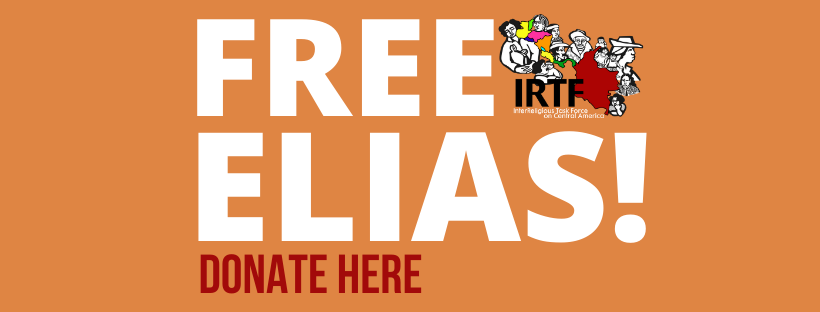- Home
- About Us
- Issues
- Countries
- Rapid Response Network
- Young Adults
- Get Involved
- Calendar
- Donate
- Blog
You are here
Guatemala: News & Updates
Guatemala had the longest and bloodiest civil war in Central American history: 36 years (1960-96). The US-backed military was responsible for a genocide (“scorched earth policy”) that wiped out 200,000 mostly Maya indigenous civilians. War criminals are still being tried in the courts.
Learn more here.
RRN Letter
February 23, 2020
Indigenous rights defender Julio Gómez Lucas is currently facing false criminal charges of incitement to commit crimes, participation in illegal gatherings of armed persons, protests, assault and attempted murder. The criminalization of environmental and indigenous defenders in Guatemala must end. Julio Gómez Lucas, a leader of the Maya Chuj community of San Mateo Ixtatán, is a member of the Peaceful Resistance of the Microregion of Ixquisis, an organization of indigenous communities formed in response to human rights violations committed by a hydroelectric company. He and his family members have previously been kidnapped and tortured because of his work in defense of land, water, and indigenous rights.
News Article
February 21, 2020
Good news... WE JUST PAID ELIAS'S BOND!
Friends, family, and fellow members of the movement,
We did it! Elias will be free from immigration detention after 6 months of incarceration. We are proud of our work but even more, we are proud of Elias and his perseverance in the face of vast injustice.
News Article
February 17, 2020
After an irregular rainy season and an unpromising harvest, almost 80% of maize grown in Guatemala’s highland region was lost, according to Oxfam. All that remains for many families are tiny corncobs studded with discoloured grains that look like rotten teeth. Central America is one of the world’s most dangerous regions outside a warzone, where a toxic mix of violence, poverty and corruption has forced millions to flee north in search of security. The threat of famine and the battle for dwindling natural resources are increasingly being recognised as major factors in the exodus
Event
February 15, 2020
SEPA is a volunteer organization that raises money through participation in the Oberlin Farmers Market, through the sale of textiles hand-woven in CopalAA and elsewhere, through a B&B program in Oberlin, and through donations from individuals and churches.
News Article
February 14, 2020
“José” is an award winning film from Guatemala about a young gay man’s struggles to find love in a socially conservative, homophobic society. “José” opens this Friday in South Florida theaters. But its star, Guatemalan actor Enrique Salanic, won't be here for the film's American premiere, as he'd hoped. That's because the U.S. has denied Salanic a visa to enter the country. “José” won the Queer Lion at the Venice Film Festival – the prize for the best LGBTQ-themed movie. But this film is different from a lot of films about gay people in Latin America. The homophobia is certainly felt. But the story focuses more on how hard it is for a gay man to secure a loving relationship there.
News Article
February 13, 2020
Study finds 42.5% interviewees leaving Guatemala, Honduras and El Salvador reported the violent death of a relative “We’re speaking of human beings, not numbers,” Sergio Martín, MSF general coordinator in Mexico, said at the study’s presentation on Tuesday. “In many cases, it’s clear that migration is the only possible way out. Staying put is not an option.” A 2019 survey from Creative Associates International found violence was the main driver of migration for 38% of Salvadorans, 18% of Hondurans and 14% of Guatemalans. In Guatemala – the main source of migrants detained at the US border with Mexico – 71% of respondents cited “economic concerns” as their main motive.
RRN Case Update
February 13, 2020
RRN case summaries at a glance
On behalf of our 190 Rapid Response Network members, IRTF volunteers write and send six letters each month to government officials in southern Mexico, Colombia, and Central America (with copies to officials in the US).
Who is being targeted? indigenous and Afro-descendant leaders, labor organizers, LGBTI rights defenders, women’s rights defenders, journalists, environmental defenders, and others.
By signing our names to these crucial letters, human rights crimes are brought to light, perpetrators are brought to justice and lives are spared. Our solidarity is more important than ever. Together, our voices do make a difference.
RRN Case Update
February 13, 2020
RRN case summaries at a glance
On behalf of our 190 Rapid Response Network members, IRTF volunteers write and send six letters each month to government officials in southern Mexico, Colombia, and Central America (with copies to officials in the US).
Who is being targeted? indigenous and Afro-descendant leaders, labor organizers, LGBTI rights defenders, women’s rights defenders, journalists, environmental defenders, and others.
By signing our names to these crucial letters, human rights crimes are brought to light, perpetrators are brought to justice and lives are spared. Our solidarity is more important than ever. Together, our voices do make a difference.
News Article
February 10, 2020
A gay refugee from El Salvador who said he fled gang violence and spent a year traveling to get to the U.S. is suing the Trump administration for sending him to Guatemala as a "safe third country." After a member of the MS-13 gang threatened him in El Salvador & his mom disowned him, he came to the U.S. But he was sent to Guatemala instead. Why does the U.S. consider Guatemala a "safe third country" for LGBTQ asylum seekers? A 2012 report from the International Gay and Lesbian Human Rights Commission said that states that LGBTQ people in Guatemala face “cruel, inhuman and degrading treatment, including a constant threat of violence that amounts to torture, forced disappearances, sexual violence in detention centers, and non-consensual medical testing.”
News Article
February 5, 2020
The Cleveland Immigration Working Group is engaged in a number of immigrant defense and support activities. We need more volunteer help. Please read below and consider helping with some of these needs: A. Safe Hotels Campaign B. Rapid Response Team C. Bond Packets for Release from Detention D. Court Monitoring E. Bus Reception F. Public Actions G. Sponsor Families H. Help for ICE Raid Victims and those in detention I. Prayer Support . If you would like to learn more about any of these initiatives, please email irtf@irtfcleveland.org or call (216) 961 0003.


